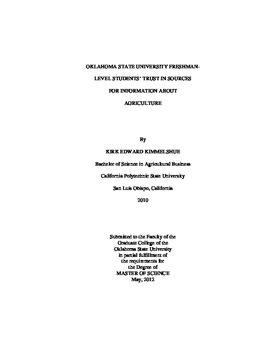| dc.contributor.advisor | Sitton, Shelly Peper | |
| dc.contributor.author | Kimmelshue, Kirk Edward | |
| dc.date.accessioned | 2014-04-15T18:36:14Z | |
| dc.date.available | 2014-04-15T18:36:14Z | |
| dc.date.issued | 2012-05-01 | |
| dc.identifier.uri | https://hdl.handle.net/11244/8387 | |
| dc.description.abstract | The population of this study was composed of all freshman-level students in the College of Agricultural Sciences and Natural Resources (CASNR) at Oklahoma State University (OSU) (N = 500) and sought to determine the perceived trust level these students had for selected sources for news and information about agriculture. The study was descriptive in nature and employed a survey research design to allow 40 sources for news and information on agriculture to be rated on a five-point summated-rating scale for level of trust as well as to allow identification of selected personal characteristics. Nearly 65% of the respondents were female, and nearly 50% were majoring in animal science or pre-veterinary medicine. Prior to coming to OSU, 57.2% of the students lived on a farm, in a rural area, or in a small town, and nearly 65% were from Oklahoma. More than 84% check their email and Facebook accounts daily, 52.8% were religious youth group members, and 48.1% were FFA members. Nearly half identified their political ideologies as conservative.The people most trusted for information about agriculture by freshman CASNR students at OSU are their parents, peers, and professors. Of the people selected for them to consider, they trust least Oprah Winfrey, Rush Limbaugh, and Michael Pollan. Freshman CASNR students trust the National FFA Organization, the National 4-H, the United States Department of Agriculture, and the Oklahoma Department of Agriculture, Food, and Forestry more than the other organizations selected in the study. Students least trust the People for the Ethical Treatment of Animals (PETA). CASNR freshmen students trust the agricultural news found in national newspapers like the The New York Times and the Wall Street Journal as well as the National Geographic magazine. In contrast, they lack trust for People magazine. Students trust Fox News, ABC News, and their local television news more than the other selected sources for online and broadcast media. Even as connected as they indicate they are to Facebook and email, the students least trust Twitter and Wikipedia for agricultural information. Future research should investigate the level of trust other groups have for these selected sources of news and information about agriculture. | |
| dc.format | application/pdf | |
| dc.language | en_US | |
| dc.publisher | Oklahoma State University | |
| dc.rights | Copyright is held by the author who has granted the Oklahoma State University Library the non-exclusive right to share this material in its institutional repository. Contact Digital Library Services at lib-dls@okstate.edu or 405-744-9161 for the permission policy on the use, reproduction or distribution of this material. | |
| dc.title | Oklahoma State University Freshman-level Students' Trust in Sources for Information About Agriculture | |
| dc.type | text | |
| dc.contributor.committeeMember | Terry, Robert, Jr. | |
| dc.contributor.committeeMember | Fitch, Gerald Jerry | |
| osu.filename | Kimmelshue_okstate_0664M_12019.pdf | |
| osu.college | Agricultural Sciences and Natural Resources | |
| osu.accesstype | Open Access | |
| dc.description.department | Department of Agricultural Education, Communications, and Leadership | |
| dc.type.genre | Thesis | |
| dc.subject.keywords | agriculture | |
| dc.subject.keywords | communication | |
| dc.subject.keywords | education | |
| dc.subject.keywords | freshmen | |
| dc.subject.keywords | oklahoma state university | |
| dc.subject.keywords | trust | |
